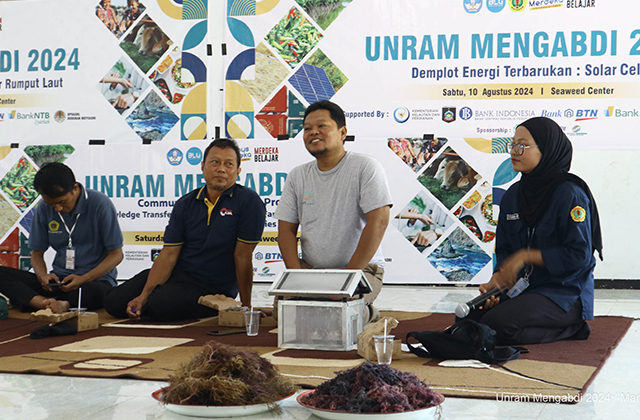Unram Mengabdi: Socialization of Renewable Energy and Training on Seaweed Drying Room Making

Mataram, University of Mataram – On August 10, 2024, the Research and Community Service Institute of the University of Mataram (LPPM Unram) held the Unram Mengabdi program at the Seaweed Center Hall, Gerupuk Hamlet, Sengkol Village, Central Lombok Regency.
One of the series of Unram Mengabdi activities this time was the Socialization of Renewable Energy (Solar Cell) and Training on Making Seaweed Drying Room. This activity was attended by 40 participants.
This activity presented four resource persons consisting of Ir. Arif Mulyanto, M.T.; Dr. Kurniawan Yunianto, S.P., M.P.; Rangga Idris Afandi, S.Pi, M.Si.; and M. Julijah, S.Kom.
The implementation of Unram Mengabdi activities 2024 chose Gerupuk Hamlet in Sengkol Village, Central Lombok, which is now the center of attention in the development of renewable energy. The existence of the marine potential in this region opens up great opportunities for the application of renewable energy technology that can have a positive impact on the local economy and environmental sustainability.
Gerupuk Hamlet is known for its rich marine resources, including stable ocean waves and currents. This potential has attracted the attention of experts and investors in the field of renewable energy, particularly wave power and sea currents. According to researchers, ocean wave power in this region has great potential that can be utilized to generate electricity in a sustainable way.
Arif in his presentation said, “The sea around Gerupuk Hamlet has ideal characteristics for the development of wave and ocean current power technology. Energy generated from waves and ocean currents is a form of renewable energy that is environmentally friendly and can be a long-term solution to meet local energy needs.”
“In addition to wave power, other renewable energy development potentials in the region include solar energy. Gerupuk Hamlet has high sunlight intensity throughout the year, making it an ideal location for solar panel installation. The integration of solar energy with wave power is expected to create a more stable and reliable energy system in supporting energy needs and improving economic standards,” Arif said.
Promising renewable energy development synergizes with the local seaweed industry. The potential for renewable energy, particularly from ocean waves and currents, is seen as key to increasing seaweed production in the region, which is one of Central Lombok’s leading commodities.
Seaweed, known for its various benefits in the food and pharmaceutical industries, has become one of the main products of the local economy. However, seaweed production is often limited by factors such as the instability of energy supply and water quality. Therefore, the application of marine renewable energy technology in Gerupuk Hamlet is expected to provide an effective solution to this problem.
With renewable energy in place, seaweed farmers in Gerupuk Hamlet can benefit from better water quality monitoring systems and equipment that require consistent electricity. This includes water pumps and aeration systems that can assist in maintaining environmental quality for optimal seaweed growth.
Seaweed is an excellent commodity that is very important to the local economy. However, efficient drying of seaweed is often a major challenge. Especially during the rainy season, seaweed drying can be limited due to high humidity. Therefore, the creation of a drying room that can be operated consistently, even in unfavorable weather conditions, is necessary.
Dr. Kurniawan Yunianto, S.P., M.P. highlighted, “The creation of seaweed drying rooms complemented with renewable energy-based heating systems, such as solar energy, can provide an effective solution to seaweed drying problems. Renewable energy allows for continuous operation of the drying system, even when the weather is unfavorable.”
Training on the construction of a seaweed drying room facility equipped with solar panels to provide the required energy. This system will ensure that the seaweed drying process is optimized regardless of weather conditions. The installed solar panels will generate electrical energy that is used for the heating and ventilation systems in the drying room.
Satria Wijaya Saraf, Head of Sengkol Village, stated, “We see the development of renewable energy as a strategic step to support the growth of the seaweed industry in our village. Stable and quality energy will greatly assist seaweed farmers in increasing their production and overcoming challenges.”
The Head of LPPM Unram, Prof. Dr. Ir. Sukartono, M.Agr. on this occasion expressed his gratitude and appreciation to all parties who have contributed to this activity.
“Today, we have witnessed an important step in developing renewable energy and increasing seaweed production in Gerupuk Hamlet. We are very grateful to all participants, the local community, and those who have supported and participated in this socialization,” he said.
He continued, “The introduction of renewable energy technology, particularly in the form of solar energy-based heating systems for seaweed drying rooms, is an innovation that can improve the efficiency and quality of seaweed production in this area. We believe that the integration of this technology will provide long-term benefits, both in terms of productivity and economy, for the people of Dusun Gerupuk.”
“It is important to remember that technology is not only about innovation, but also about how we apply it to improve people’s quality of life. This program aims to empower seaweed farmers by providing supportive facilities, as well as providing the necessary training to utilize this technology effectively,” concluded Prof. Sukartono.
